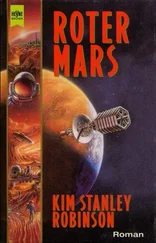It might end the pain. It might return them to their hot tawny beach. It might… They looked each other in the eyes, stood with some difficulty, followed the figure east.
It was hard going, even on the trail. At sunset each day they descended to the beach, the sun sinking into the eastern sea. Over time they wove capes of palm and fan seaweed; and each night they foraged for food, and the swimmer found a mollusk that when eaten dulled the pain of her arm, and Thel’s joints. But the spine was getting higher and higher as they moved farther to the mirror east, and the trail stayed right on the crest of the spine, and the descent to the beaches became more difficult. Tinou stayed about the same distance ahead of them, so perhaps he was descending to water each night as well; but finally one sunset it was impossible, and the next, possible but too strenuous to contemplate. Besides, in the dusk the swimmer caught sight of Tinou, sitting next to the trail far above them; so they slept tucked in a fault to get out of the wind, and it was cold but they found bird’s nests, and were able to raid them for food. Holes and dips in the granite held rainwater for their thirst, and the swimmer had dried a collection of the mollusks for their pain. But these ran out quickly enough.
Because the spine continued to rise they caught sight of Tinou several times a day, always most of a day’s walk ahead of them, a speck against the pinkish broken granite of the spine’s bony edge. The peninsula here resembled the precipitous blade of rock that Thel had traversed with the treefolk, a knife edge of scarcely weathered granite slicing the world ocean into two halves, so many thousands of feet high that the waves were no more than the faintest pattern of curves on the sea; and yet if the peninsula had been nothing but dunes, it would have been only a morning’s walk to cross it from sea to sea. Higher and higher this great ridge arched into the sky, in irregular swoops, with many small ridge peaks, and an unhappily large number of sudden drops in the ridge line that they were forced to climb down, and then up again. As they made their way they sometimes saw broken bird nests scattered down the cliffs to right and left, the precious meat of eggs burst and dried over the rocks and sticks: Tinou had been kicking them apart as he passed, and so must have known they were following.
When the swimmer’s mollusks were gone, they hiked on in pain; her arm never healed, and Thel’s joints creaked as if filled with grit, and each day’s march added to their scrapes, bruises, sprains: and none of these ever seemed to heal. In the mirror world their bodies had lost that ability. Hunger plagued them as well, but not thirst; some of the ponds they passed had Tinou’s feces floating in them, but there were more of the little granite pools than he could find to foul, and they drank as deeply as if they might be able to get their sustenance from water alone. They ate mice, and birds, and eggs, and once a whole glorious patch of blueberries; then later, the bright green moss that Thel had found on the drawbridge. There was a lot of this moss as they climbed higher—moss, and blotchy lichen, and junipers and foxtail pines that up here were nothing but little wind-tortured bushes, tucked between boulders and down in cracks. They slept under these piney shrubs, and tried eating their cones but couldn’t.
One evening in the indigo twilight Thel looked at the swimmer’s bright pain-filled eyes. It was hard to remember the world on the other side of the mirror, their life on the hot tawny beach—a blur, a moment like the snapping of fingers, a dream. He said, “We never gain on him, and we’re going slower every day. My joints—” he stopped, wanting to cry. “I’m hungry,” he said instead.
She gave him a handful of the moss. He noticed that her fingers were narrower and longer, with full webs of skin between them, and a dusting of blond fur over the backs of the hands. She said, “Whatever happens, you must accept it.”
He ate, considering what that implied. His own hands were gnarled and his thumbs were longer and less opposed to the fingers than they used to be. Flickering, pulsing, throbbing, shooting, lancing, cutting, rasping, splitting, yes. All of these. “Maybe,” he said, feeling his face and the enlarged jaw, “maybe if we made an extraordinary effort. If we hiked all night—if we kept hiking till we caught him, you know. He’s sleeping at night like we are, or we’d never be keeping pace with him. If we dispensed with that, and hiked all night…”
“Tomorrow,” she said, sleepy. Her nose was smaller, and it twitched at the end. “One last night of rest, and we’ll start tomorrow.”
So the next sunset they stopped and foraged hard, collecting for their waist bags a bit of everything that was not granite itself, and they kept walking as the sun’s light dimmed in the eastern sky, until only a few clouds high over the eastern sea caught a dim red glow in the deep indigo; and then by the light of the million stars they stumbled on.
Even in these remote heights the trail continued to wind its way along the spine crest, weaving to north or south depending on the shape of the rock and the cliffs on each side. The trail was in poor repair and had not been used, it appeared, in years. Sometimes, because it was the only flatness in a vertical landscape, and had been crushed to sand over the centuries, it was the only foothold for the green moss, so that a mossy path extended through the white rock, a highly visible black sidewalk in the starry night. Elsewhere the trail was just a slightly less obstacle-filled track of blasted rock, and nearly impossible to see. They kept losing it and coming on it again, and each time they rediscovered it Thel felt a tiny bit of satisfaction, of communion across time with whoever had built the trail; they had both picked the same route as best. And now it was essential that they keep to that route, if they were not to come to some impassable drop-off or rise; so in places they moved on hands and knees, feeling for sand and the intangible traces of earlier feet. At times they could move their heads to the side and stare straight down to the obsidian sea, flat and glossy some thousands of feet below; then they crawled, happy to hug the rock, long past talk, merely panting, gasping, from time to time whimpering or cursing under their breath, or simply groaning.
It was a long night. When dawn came and light leaked back into the world, in the hour when everything was made of translucent slabs of gray, Thel looked at the swimmer and observed that her whole shape was changing; torso longer, feet longer, ribs visible but not quite human, she was making a slow transformation back to something clearly aquatic—as she had always been, but now it was more pronounced, obvious that her race had descended from some fluid water mammal. She would be forced to crawl all the time if the transformation continued. And if her joints felt anything like his… he exerted the discipline, peered through the black haze of pain, saw that his own legs were thicker and his arms longer and heavier: it was a comfortable prospect to walk on all fours, and climbing the endless granite staircase of the spine was in some senses a happy challenge. Tree ancestor, he thought, and the image of a quick beautiful creature came into his mind, with the word baboon.
When the sun rose behind them, he looked at the ridge ahead carefully. This was the time of day when Tinou, looking back into the western dawn, would have trouble spotting them; while they looked up the ridge for him with the blaze of a nearby star as their spotlight. And eventually Thel’s patience was rewarded. A head popped over the rock, just above and beyond them, a few minutes’ walk only, and Tinou emerged, looked back blindly into the sun, and then hiked east up the ridge trail.
Читать дальше












